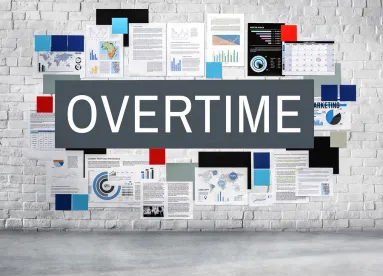In 2016, the Department of Labor issued long-awaited amendments to the Fair Labor Standards Act (“FLSA”) regulations that would have raised the minimum salary for employees exempt under the so-called “white collar” exemptions from $455/week ($23,660 annually) to $913/week ($47,476 annually) (the “Final Rule”). The Final Rule also would have required an upward adjustment to the minimum salary level every three years, with the first automatic increase scheduled to occur on January 1, 2020.
On November 22, 2016 – the eve of the December 1 effective date of the Final Rule – we reported that Judge Amos L. Mazzant of the Eastern District of Texas preliminarily enjoined the Final Rule’s implementation, finding that the Department of Labor (“DOL”) exceeded its Congressionally-delegated authority by raising the salary threshold. That decision – which preliminarily enjoined the implementation of the Final Rule nationwide – was appealed to the Fifth Circuit Court of Appeals.
That appeal has not yet been ruled on, but in the interim, Judge Mazzant issued a final decision on the Plaintiffs’ (comprised of 21 states and, through a consolidation of a separate lawsuit alleging similar claims, the Plano Chamber of Commerce and 55 Texas and national business groups) accelerated motion for summary judgment in the case. Judge Mazzant’s decision, not surprisingly, echoed the rationale set forth in his November 2016 ruling on the motion for preliminary injunction, as he again concluded that the DOL improperly used a salary-level test to determine which workers are exempt from overtime compensation.
Judge Mazzant opined that the “significant increase” in the minimum salary threshold rendered meaningless the analysis of exempt employees’ primary duties, thus supplanting Congress’ intent when it passed the FLSA. That is, although Congress explicitly granted authority to the DOL to “define[] and delimit[]” the terms “bona fide executive, administrative, or professional capacity” through regulation, the court concluded the DOL exceeded this authority by significantly increasing the salary threshold, as Congress “unambiguously intended the exemption to apply to employees who perform ‘bona fide executive administrative or professional capacity’ duties,” without regard to compensation. Judge Mazzant continued: “[T]he Department [of Labor] does not have the authority to use a salary-level test that will effectively eliminate the duties test . . . [n]or does the Department have the authority to categorically exclude those who perform ‘bona fide executive, administrative, or professional capacity’ duties based on salary level alone.”
The preliminary injunction already was on appeal to the Fifth Circuit, but the DOL indicated in its appellate reply brief that it had decided not to advocate for the $913/week salary level any further and instead intended to undertake further rulemaking to determine what the salary level should be. That position coupled with the district court’s summary judgment ruling effectively put the final nail in the coffin on the Final Rule. Even before today’s decision, on July 27, 2017, the DOL, under the guidance of newly-confirmed Secretary R. Alexander Acosta, submitted a request for information (“RFI”) seeking public input on the overtime rule. The RFI, responses to which are intended to aid the DOL in the development of a notice of proposed rulemaking, seeks comment and information on 11 subjects, including whether the standard salary level set in the current FLSA “white collar” exemption rule effectively identifies employees who may be exempt, whether a different salary level would more appropriately identify such employees, and whether changes to the duties test would be necessary to sync up the exemption to the salary level. Written comments in response to the RFI are due by September 25, 2017.




 />i
/>i
